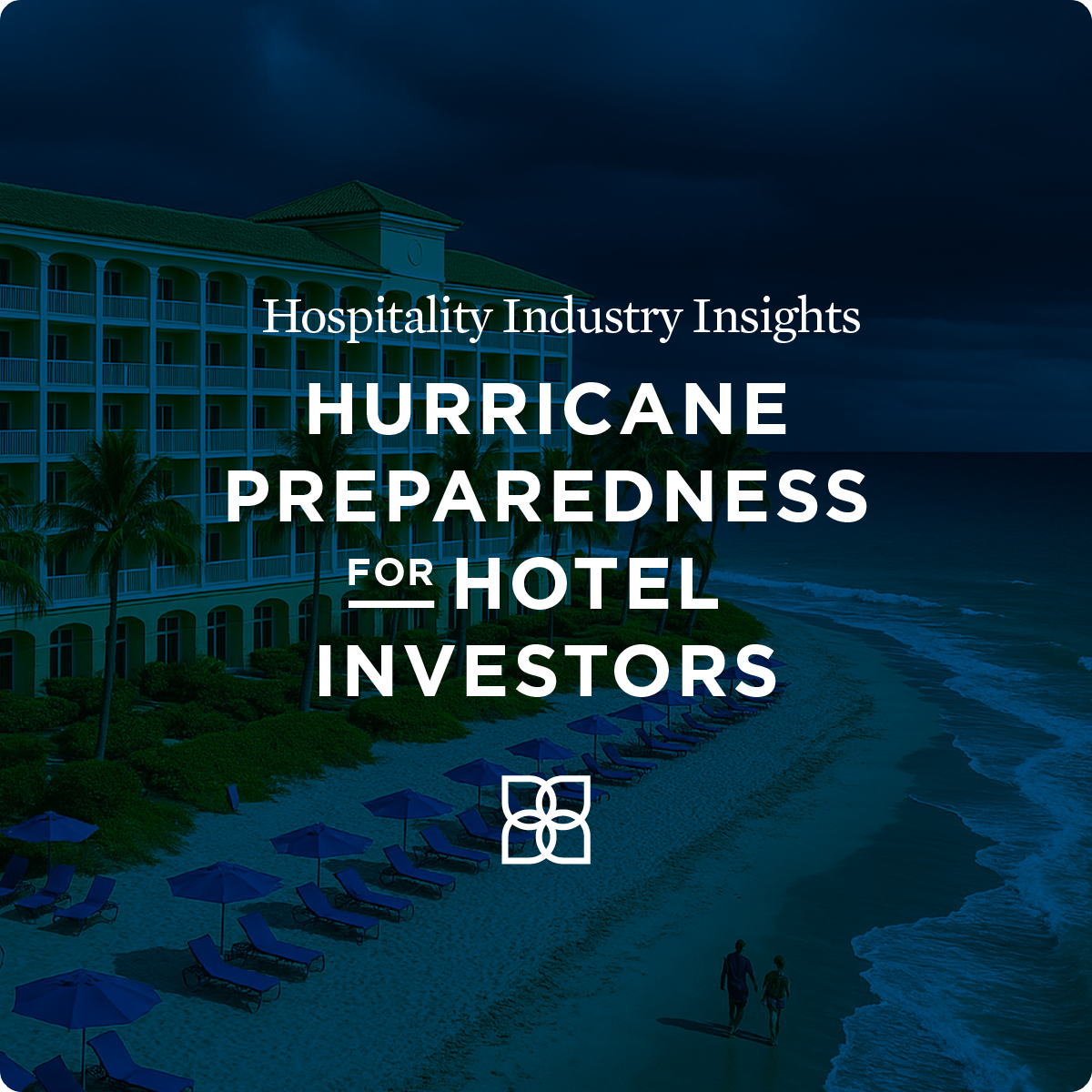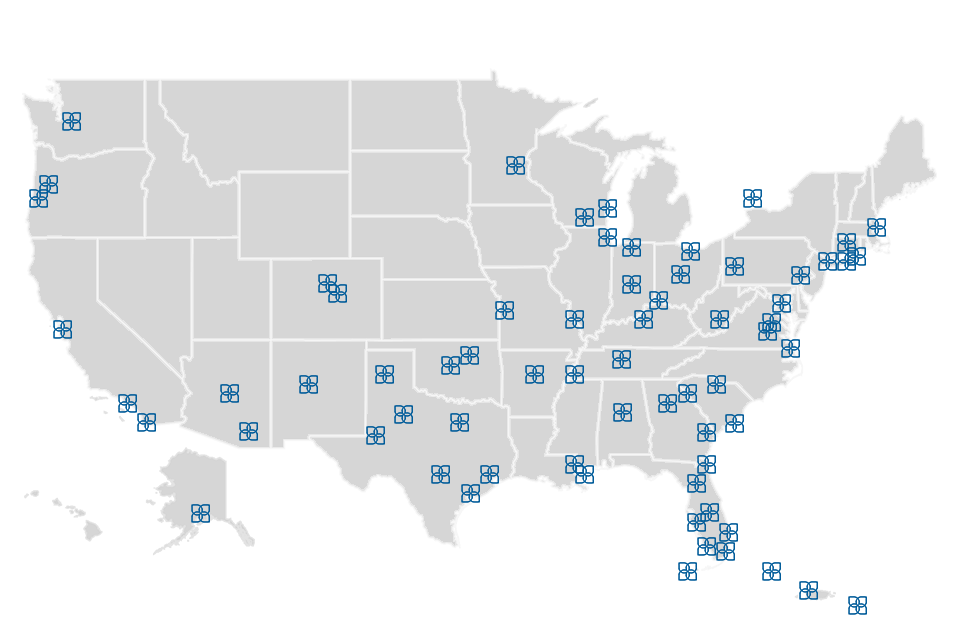
Download a PDF copy of Hurricane Preparedness for Hotel Investors by Michelle Hayes and Chris Plasencia.
The Plasencia Group’s Framework for Hurricane Season
Hurricane season (NOAA’s outlook for 2025) brings both significant downside risk and meaningful upside opportunity for hotel investors. Unlike other types of commercial real estate, hotels have unique vulnerabilities: guest safety considerations, multiple revenue streams at risk, brand compliance requirements, and constant pressure to reopen quickly before competitors capture displaced demand.
In our 30+ years of hospitality investment advisory, particularly across the Southeast and Gulf Coast, we have seen how proper hurricane preparedness can mean the difference between being offline for months or capturing premium rates and elevated occupancy while competitors remain shuttered. The key is treating hurricane planning not as an operational afterthought but as a recurring, strategic component of your investment thesis.
The 5 Most Important Areas of Focus to Protect Assets and Capture Opportunity
1. Strategic Risk Assessment: Beyond the Obvious
Too many hurricane assessments stop at the basics – roof condition, window integrity, drainage. Hotel owners and operators benefit from digging deeper into revenue implications: evaluating backup power for elevators so guests aren’t climbing ten flights of stairs, checking the weathertightness of PTAC units, assessing guest room window and sliding door integrity for liability and habitability, keeping critical systems well above flood-prone levels, and understanding which revenue-generating areas are most exposed.
We conduct these assessments annually for owners we advise, and we factor findings into CapEx planning (Read more about The Plasencia Group’s emergency crisis planning). Even modest investments in drainage or window upgrades can prevent millions in damage while positioning the asset to reopen first and capture post-storm demand surges.
2. Advance Work: Strategic Oversight Required
Before hurricane season, owners and operators should establish clear communication protocols for rapid decision-making, including emergency expenditure authority, since delays in authorizing critical repairs can turn minor issues into major reconstruction. Insurance programs should be tailored to hotel-specific revenue risks and guest displacement scenarios; standard commercial policies often leave gaps. Just as importantly, restoration vendor relationships must be negotiated in advance. The contractors you want after a storm are rarely the ones answering phones for new clients during the crisis.
We also recommend each property designate a hurricane incident commander – typically the GM or an owner’s representative – with clear reporting lines and authority to execute recovery strategy. This isn’t about micromanaging operations; it’s about ensuring someone with an ownership perspective drives the process with a comprehensive view of the asset in mind.
3. Vendor Strategy: Hospitality Recovery Specialists
Not all restoration companies understand hotels. Contractors who excel at office or retail projects often falter with the complexities of guest-occupied properties and brand standards. The best hospitality-focused vendors offer 24/7 capability, understand FF&E and franchise compliance, can prioritize revenue restoration (guest rooms first, amenities later), and know how to operate unobtrusively around any remaining guests.
Hoteliers who pre-negotiate Master Service Agreements during calm weather as part of a hurricane preparedness plan – with pricing and performance standards locked – avoid the chaos and inflated costs of post-storm contracting. We’ve seen too many investors lose weeks and millions because the “available” vendor didn’t understand hotel operations.
4. Timeline Strategy: Positioning for Post-Storm Success
Hurricane preparedness isn’t just about protection; it’s about positioning your asset to capture demand when supply is disrupted. After major storms, markets with damaged inventory often experience dramatic rate and occupancy spikes among functioning properties – FEMA contractors, insurance adjusters, relief workers, and displaced residents can sustain demand for months.
That upside is only available to hotels that act early. Within the 72-hour forecast window, the property should implement a guest communication strategy that preserves bookings and reputation; guests appreciate transparency and often reschedule rather than cancel when kept informed. Staff planning is critical as skeleton crews may need to shelter in place, and the right people on property dramatically impact reopening speed. To the extent safety allows, revenue stream shutdowns should be sequenced strategically – last to close, first to reopen – to minimize lost income. It’s important to note that hotels should follow local guidance regarding evacuation. Early evacuation when not required could negate insurance coverage for displaced revenues.
In the final 24 hours before hurricane landfall, focus turns to guest safety protocols and ensuring backups for PMS and payment systems, as outages can cripple operations for weeks. Documenting pre-storm condition at this point is critical. Thorough records directly correlate with faster, higher insurance settlements.
After the storm, sequence recovery to maximize revenue: restore guest check-in capability and habitable rooms first, provide basic food service, then progressively bring restaurants, meeting space, and amenities back online. Even partial reopening can drive extraordinary performance as displaced demand concentrates among operational assets. We’ve seen clients generate months’ worth of revenue from a recovery advantage measured in weeks.
5. Documentation and Insurance: The Hidden ROI Driver
Proper documentation and insurance coordination often impact returns more than any other single factor. Treat this process as seriously as your annual audit.
Pre-storm, conduct comprehensive photo and video inventories of all revenue spaces and a room-by-room condition log. Record FF&E serial numbers and condition for high-value items. Verify reservation and financial data backups; they’re essential for business interruption claims.
Insurance claims for hotels are complex and often involve multiple revenue streams, brand compliance requirements, and varying timelines for restoration. Business interruption coverage must account for rooms, F&B, events, and amenities, each with different profit margins. Franchisors often require upgrades as part of restoration; owners who know which improvements qualify for coverage can avoid costly surprises. Guest relocation and temporary operations coverage (like mobile kitchens) can mean the difference between maintaining some revenue and going dark.
The Bottom Line: Hurricane Preparedness as Competitive Advantage
Hurricane preparedness, when approached strategically, protects downside risk and creates significant upside. Properties that recover quickly don’t just return to baseline – they capture market share and revenue premiums that can last well beyond the crisis period.
The Plasencia Group has guided hotel investors through advance planning and recovery in virtually every major storm-affected market in the Southeast, Gulf Coast, and Caribbean. Our focus is simple: protect asset value and position properties to capitalize on post-storm market dynamics.
Hurricane preparedness is about more than just weathering the storm – it’s about protecting your people, preserving your assets, and positioning your property to emerge, post-storm, stronger than the competition.
Contact The Plasencia Group to learn how our owner representation services can help you turn hurricane preparedness into a strategic advantage for your investments.
For more valuable hospitality industry news and analysis, opt-in to our communications list. If The Plasencia Group may be of assistance at any point throughout the entire lifecycle of your hotel, resort, or portfolio investment, reach out to any one of our skilled investment advisors today to start the conversation.


